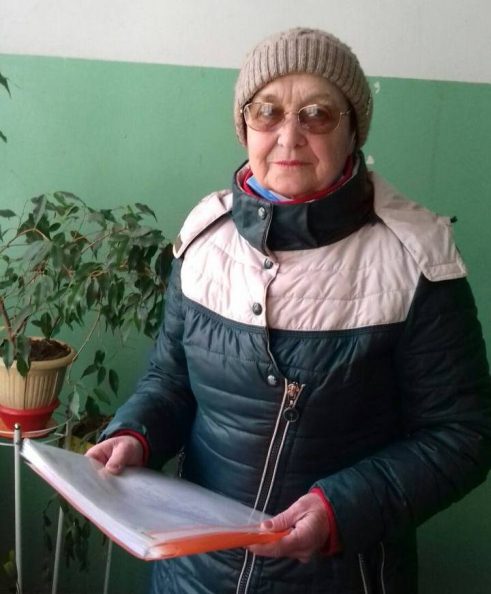How older people prop up their communities in the war
“Each person sings the song of their own fate, and then suddenly this song is cut off by war… What do you do after this, where do you go from there,” Lyudmila muses.
Creative by nature, she likes to get poetic, she admits, but 70-year-old Lyudmila Tishchenko knows what she is talking about. She has been a social care worker in the Dnipropetrovsk region of eastern Ukraine for more than five years. In addition to talking about her own experience, she can echo the thoughts of the people she has worked with.

The challenges of social care work
In November 2022, Lyudmila joined HelpAge International’s large team of social care workers who support older people across Ukraine. Despite making up a quarter of the country’s population, older people’s specific needs in the war are often neglected. Our most recent survey finds that they receives less assistance and are generally worse off than the rest of the population. HelpAge has been relying on social care workers since 2014 to understand their needs, support them, and advocate to make sure that their voices are heard.
The work is challenging, especially in the context of a full-scale invasion. Some of these cases are impressive stories of survival. Lyudmila recalls a 90- and 66-year-old mother and daughter who spent more than 40 days in the basement before managing to evacuate to safety. Having lost everything they had, they had to start over, battling the challenges of displacement and deteriorating health.
Lyudmila explains why she chose such an emotionally taxing occupation after retirement: “I love people. I enjoy interacting with them. I am happy with them and feel for them. When I heard that social workers were needed, it was an easy decision to make.”
She has 11 people under her care she visits regularly to provide psychosocial support, aid, and information on available assistance. “That’s 11 different personalities, 11 different sets of circumstances and needs,” she says.
After having to flee the Luhansk and Donetsk regions, most of them now live in a shelter. With an average pension of 115 GBP (around $143) as their only income, they struggle to cover their basic needs. Some gaps are filled through international organizations such as HelpAge, which delivers support such as commode chairs, walking canes, and incontinence pads.
The biggest challenge for most is access to medicines; The only pharmacy in the area is not well stocked, and a trip to the neighboring village can be a challenge, as public transport is scarce.
Lyudmila stresses that they need more support. Luckily, being from the same community and having similar experiences, she understands their situation and can be of help just by being there: “They are very vulnerable to stress … sometimes all you can do is be a shoulder to cry on. You may not always be able to solve their problems but they like knowing that someone listens, someone understands.”
Empathy and perseverance
“God must have a lot of love for us if He sent us Lyudmila,” a woman, 89, says, touched by the support. “The incontinence pads, the walkers – the things we need, especially for those of us who are over 70, are so expensive. “We could have never afforded it,” another 65-year-old woman explains.
“People are in despair; I have to muster all the strength and optimism I have, to hold them up,” Lyudmila says.
Optimism is something she is most known for. Every HelpAge staff member who has worked with her says she is the most inspirational person they have met. Lyudmila herself laughs it off as being due to her “age and diverse work background”.
“I have had a wide variety of jobs, from an animal husbandry specialist to a lab assistant and a librarian. Work is a treasure, but whatever work you do, the most important thing is to show humanity a sense of justice and compassion.”
This has also helped her in her work with older people: “As a social care worker, you have to have this: empathy and perseverance.”

During her own experience with the war, mass power outages caused her home, as well as the shelter for displaced people, to be so cold that it affected their health. She was often unable to reach the shelter by phone to check in on the older people, so she would physically go to see them.
In Kurylivka, a small village west of Dnipro city where Lyudmila lives, the situation is now a bit calmer compared to early 2023. However, the sounds of distant explosions are still a constant background. After what Lyudmila says was the scariest year of her life, the initial fear has been replaced with hope: “We hope that good, hard work, and justice will triumph.”


